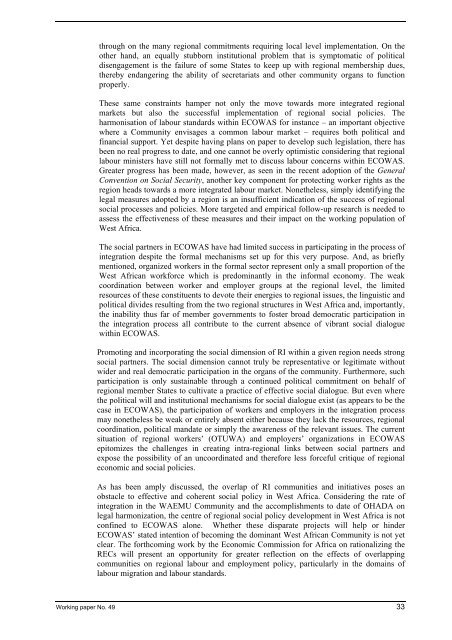The Social Dimension of Regional Integration in ECOWAS
The Social Dimension of Regional Integration in ECOWAS
The Social Dimension of Regional Integration in ECOWAS
You also want an ePaper? Increase the reach of your titles
YUMPU automatically turns print PDFs into web optimized ePapers that Google loves.
through on the many regional commitments requir<strong>in</strong>g local level implementation. On the<br />
other hand, an equally stubborn <strong>in</strong>stitutional problem that is symptomatic <strong>of</strong> political<br />
disengagement is the failure <strong>of</strong> some States to keep up with regional membership dues,<br />
thereby endanger<strong>in</strong>g the ability <strong>of</strong> secretariats and other community organs to function<br />
properly.<br />
<strong>The</strong>se same constra<strong>in</strong>ts hamper not only the move towards more <strong>in</strong>tegrated regional<br />
markets but also the successful implementation <strong>of</strong> regional social policies. <strong>The</strong><br />
harmonisation <strong>of</strong> labour standards with<strong>in</strong> <strong>ECOWAS</strong> for <strong>in</strong>stance – an important objective<br />
where a Community envisages a common labour market – requires both political and<br />
f<strong>in</strong>ancial support. Yet despite hav<strong>in</strong>g plans on paper to develop such legislation, there has<br />
been no real progress to date, and one cannot be overly optimistic consider<strong>in</strong>g that regional<br />
labour m<strong>in</strong>isters have still not formally met to discuss labour concerns with<strong>in</strong> <strong>ECOWAS</strong>.<br />
Greater progress has been made, however, as seen <strong>in</strong> the recent adoption <strong>of</strong> the General<br />
Convention on <strong>Social</strong> Security, another key component for protect<strong>in</strong>g worker rights as the<br />
region heads towards a more <strong>in</strong>tegrated labour market. Nonetheless, simply identify<strong>in</strong>g the<br />
legal measures adopted by a region is an <strong>in</strong>sufficient <strong>in</strong>dication <strong>of</strong> the success <strong>of</strong> regional<br />
social processes and policies. More targeted and empirical follow-up research is needed to<br />
assess the effectiveness <strong>of</strong> these measures and their impact on the work<strong>in</strong>g population <strong>of</strong><br />
West Africa.<br />
<strong>The</strong> social partners <strong>in</strong> <strong>ECOWAS</strong> have had limited success <strong>in</strong> participat<strong>in</strong>g <strong>in</strong> the process <strong>of</strong><br />
<strong>in</strong>tegration despite the formal mechanisms set up for this very purpose. And, as briefly<br />
mentioned, organized workers <strong>in</strong> the formal sector represent only a small proportion <strong>of</strong> the<br />
West African workforce which is predom<strong>in</strong>antly <strong>in</strong> the <strong>in</strong>formal economy. <strong>The</strong> weak<br />
coord<strong>in</strong>ation between worker and employer groups at the regional level, the limited<br />
resources <strong>of</strong> these constituents to devote their energies to regional issues, the l<strong>in</strong>guistic and<br />
political divides result<strong>in</strong>g from the two regional structures <strong>in</strong> West Africa and, importantly,<br />
the <strong>in</strong>ability thus far <strong>of</strong> member governments to foster broad democratic participation <strong>in</strong><br />
the <strong>in</strong>tegration process all contribute to the current absence <strong>of</strong> vibrant social dialogue<br />
with<strong>in</strong> <strong>ECOWAS</strong>.<br />
Promot<strong>in</strong>g and <strong>in</strong>corporat<strong>in</strong>g the social dimension <strong>of</strong> RI with<strong>in</strong> a given region needs strong<br />
social partners. <strong>The</strong> social dimension cannot truly be representative or legitimate without<br />
wider and real democratic participation <strong>in</strong> the organs <strong>of</strong> the community. Furthermore, such<br />
participation is only susta<strong>in</strong>able through a cont<strong>in</strong>ued political commitment on behalf <strong>of</strong><br />
regional member States to cultivate a practice <strong>of</strong> effective social dialogue. But even where<br />
the political will and <strong>in</strong>stitutional mechanisms for social dialogue exist (as appears to be the<br />
case <strong>in</strong> <strong>ECOWAS</strong>), the participation <strong>of</strong> workers and employers <strong>in</strong> the <strong>in</strong>tegration process<br />
may nonetheless be weak or entirely absent either because they lack the resources, regional<br />
coord<strong>in</strong>ation, political mandate or simply the awareness <strong>of</strong> the relevant issues. <strong>The</strong> current<br />
situation <strong>of</strong> regional workers’ (OTUWA) and employers’ organizations <strong>in</strong> <strong>ECOWAS</strong><br />
epitomizes the challenges <strong>in</strong> creat<strong>in</strong>g <strong>in</strong>tra-regional l<strong>in</strong>ks between social partners and<br />
expose the possibility <strong>of</strong> an uncoord<strong>in</strong>ated and therefore less forceful critique <strong>of</strong> regional<br />
economic and social policies.<br />
As has been amply discussed, the overlap <strong>of</strong> RI communities and <strong>in</strong>itiatives poses an<br />
obstacle to effective and coherent social policy <strong>in</strong> West Africa. Consider<strong>in</strong>g the rate <strong>of</strong><br />
<strong>in</strong>tegration <strong>in</strong> the WAEMU Community and the accomplishments to date <strong>of</strong> OHADA on<br />
legal harmonization, the centre <strong>of</strong> regional social policy development <strong>in</strong> West Africa is not<br />
conf<strong>in</strong>ed to <strong>ECOWAS</strong> alone. Whether these disparate projects will help or h<strong>in</strong>der<br />
<strong>ECOWAS</strong>’ stated <strong>in</strong>tention <strong>of</strong> becom<strong>in</strong>g the dom<strong>in</strong>ant West African Community is not yet<br />
clear. <strong>The</strong> forthcom<strong>in</strong>g work by the Economic Commission for Africa on rationaliz<strong>in</strong>g the<br />
RECs will present an opportunity for greater reflection on the effects <strong>of</strong> overlapp<strong>in</strong>g<br />
communities on regional labour and employment policy, particularly <strong>in</strong> the doma<strong>in</strong>s <strong>of</strong><br />
labour migration and labour standards.<br />
Work<strong>in</strong>g paper No. 49 33

















